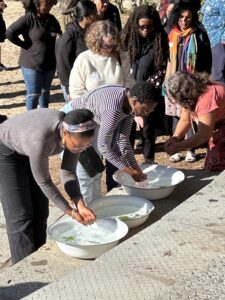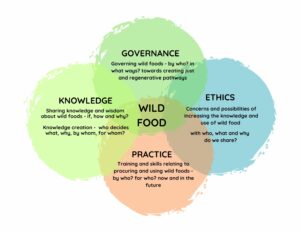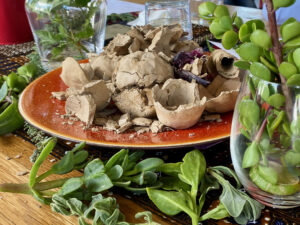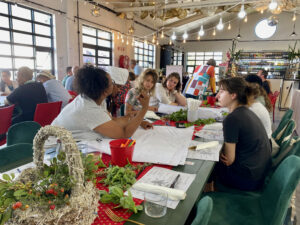The Greater Cape Floristic Region (GCFR) is a global biodiversity hotspot threatened by agriculture and urbanisation, holding an estimated 1,700 edible plant species, most of which have been disappearing from landscapes and memories over centuries.
The Sustainability Institute’s Local Wild Food Hub is focused on exploring and putting into practice pathways to normalising the daily use of resilient but neglected foods of the GCFR landscapes, so that they are embedded in contemporary food traditions and food growing practices.
In partnership with the DSI-NRF Centre of Excellence in Food Security, the Local Wild Food Hub hosts a Community of Practice (CoP) as a space for collective exploration and exchange. Diverse knowledge-holders and practitioners are invited to grapple with the risks, benefits, concerns and barriers to reviving the use of neglected and dis-acknowledged wild food plants, including what prevents these foods from reaching people’s plates.
The CoP has brought together cooks, growers, traditional knowledge holders, archivists, community activists, and multidisciplinary researchers to explore the value of ‘knowing, growing, and using’ these plants. There is a profound opportunity, for example, to tap indigenous food plants, naturally adapted to local soil and rainfall patterns, as climate resilient sources of nutrition in communities ever-increasingly impacted by food insecurity, early childhood stunting and other disease burdens linked to the unaffordability of healthy food. Practising this ethically and inclusively requires the combined knowledge and resources of many different collaborators.

Participants gather at the waskom, to begin the day Photo by: Loubie Rusch
The CoP platform opens the opportunity for participants to connect and learn from one another, to break down silos and level power dynamics that often pervade participatory spaces. Instead, through a wild food lens, participants are invited to self-organise and explore deeply intertwined and often contested challenges like: climate change, malnutrition and food insecurity, erosion of indigenous knowledge, the preservation of cultural heritage, habitat and biodiversity loss, and communities’ access to wild resources in protected environments.
Addressing complex legacies
Across the continent, numerous indigenous food crops from the northern summer rainfall areas, such as sorghum, millet, and various leafy greens, remain widely in use. However, the situation in the GCFR, with its winter rainfall and Mediterranean-type climate, is different due to its unique history and ecology.
Historically painful legacies of colonisation, indigenous knowledge erasure, forced removals from land and the erosion of natural and wild landscapes have shaped the regional context. Additionally, the heavy footprint of industrialised agriculture and food systems all continue to shape the context for exploring the indigenous foods of the GCFR in the present day, says Loubie Rusch, the coordinator of the Local Wild Food Hub.
Hundreds of years ago, local people would have known the wild foods in their landscapes intimately as they moved seasonally to feed themselves and access diverse sources of nutrition throughout the year. That way of life was violently upended by colonisation and the introduction of agriculture with imported crop varieties, severing people’s relationships to land and eroding knowledge of edible landscapes from living memory over generations.
Today, the dominance of industrial agriculture and food systems, rooted in large-scale monoculture production of crops like maize and wheat, largely restricts low-income people to a diet of uniform staples. Furthermore, many have turned their backs on indigenous plants as “poor man’s food”, aspiring to meat-heavy and highly processed ‘convenience’ diets that are associated with affluence.
Shaping new pathways from emerging insights
The multi-stakeholder CoP strives to surface and engage with such complexities through ongoing cross-cultural, transdisciplinary, and intergenerational listening, dialogue and sense-making. Agendas for each subsequent engagement emerge and evolve out of the different questions, concerns and priorities participants bring to the platform.
This approach has brought together various community-led systems. These include: small-scale growers organising themselves into farmer-led agri-hubs, volunteer cooks running community kitchens from their homes, community co-researchers using arts-based methodologies to surface complex food relationships in people’s lives, indigenous elders and knowledge holders and botanists and oral historians documenting plant knowledge while safeguarding against commercial and academic exploitation.
Sthembile Ndwandwe, a postdoctoral researcher at the University of Cape Town, for example, recently reflected:
“In the documentation of knowledge and cultures, what happens to community knowledge when researchers collect that knowledge in their projects? How do you publish with the communities? Who benefits when industries get created out of this knowledge?”
Exploration of such varied themes has called for a slow, non-hierarchical approach that centres listening and building trust.

“Creating an inclusive space to allow everyone in has been fundamental to how the Community of Practice has operated. We are grappling to be structured enough to give some form to the process, yet open enough to freely allow the voices and explorations of all the participants,” says Loubie Rusch.
Creative and inclusive approaches
Using creative methods that evoke the conviviality and sensory immediacy of food has served this purpose. An initial stakeholder mapping workshop, held in 2022, surfaced four exploratory themes: knowledge, practice, ethics, and governance. At a round table event the following year, participants were invited to expand on these themes in conversation over a four-course indigenous food menu.

According to analysis by CoP member Maya Marshak, highlights of those conversations included:
- Understanding wild food as a knowledge commons, not a commodity;
- Safeguarding the role of wild foods in climate resilience and biodiversity protection, and the need to protect wild foods.
- Situating wild food knowledge in place, and centering relationships between people, place, land and plants.
- Redefining governance and fostering local, polycentric forms of governance.
- Exploring the risks and benefits of sharing wild food knowledge.
- Shifting hierarchies of knowledge to include multiple intergenerational and community spaces.
- Promoting ethical and participatory scholarship.
- Respect for sacred and traditional knowledge – what can and can not be shared.
At a subsequent CoP gathering held in May 2024, participants were invited to explore more personal meanings of wild food. Taking part in a ‘dream walk’ through the grounds and the indigenous food garden at the Sustainability Institute, they enthusiastically shared stories about the buchu, searsia berries and other plants they encountered along the way.
The current focus is on drawing greater participation from the local communities surrounding the Sustainability Institute in the CoP, while encouraging existing participants to self-organise in interest-led focal groups. Feedback from CoP events has indicated a hunger for more learning, practical training, and engagement with wild food plants. As an emergent practice space, bridging across many sectors and knowledge systems, the intent is for the CoP to serve as a platform for networking and collaboration among participants to build their momentum in ‘knowing, growing, and using’ local wild foods to promote social and ecological regeneration.

Photography by Storm Meintjies and Loubie Rusch
related Articles
Marula Matters: Fungi, fruit, and the future of food
Jarrod Bubb, a recent MScAgric graduate in Plant Pathology from the University of Pretoria’s Department of Plant and Soil Sciences,…
UKUDLA: Call for Master’s Scholarship Applications Cohort 2, 2025
The African-German Centre for Sustainable and Resilient Food Systems and Applied Agricultural and Food Data Science (UKUDLA) invites applications…
Greater Cape indigenous foods back on the map with groundbreaking partnership
Pickled veldkool. Photo: Loubie Rusch. A groundbreaking new partnership between the DSI-NRF Centre of Excellence in Food Security (CoE-FS), Local…



